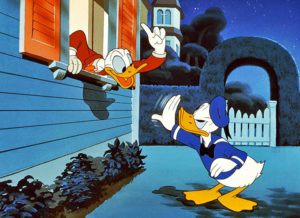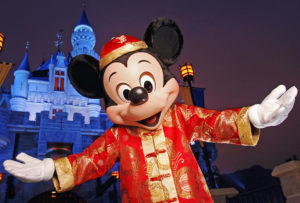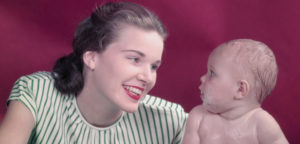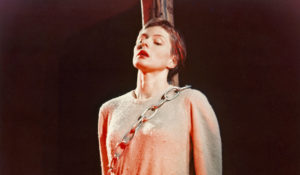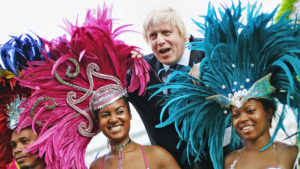On Sunday, as hundreds of thousands queued to see the mortal remains of our Queen lying in state, I stood in a shorter queue, to see a different queen in the flesh. The occasion was my daughter’s long-planned birthday excursion to the West End musical staging of Frozen. And it was magnificent. We thrilled, wept, and whooped all the way through; the show’s high point — the Sparkly Elsa Dress Reveal — even received a standing ovation.
But in the odd moment during the performance when I briefly regained the ability to think, I was struck by the fact that everyone in the cast spoke, and sang, with American accents. It’s clear enough from the show’s cast list that pretty much every performer is UK-born. The Theatre Royal Drury Lane is, obviously, in the UK. Frozen is set in a fictional country with Nordic styling. Why, then, the accent?
It would have been jarring to see the Frozen story done with English accents — but equally, it’s hard to think of a more vivid example of American soft power than a stage full of English actors performing an American movie in American accents. And of all the delivery mechanisms for that soft power, there are few more pervasive, and powerful, than the American cultural colossus Walt Disney.
Disney, a $200 billion corporate and creative titan, is itself an instance of the American Dream: founded by two Midwesterners on creativity, hard work, sweating employees, and the ruthless protection of copyright. (They’ll even sue day care centres for using Disney images without a licence.) In Disney’s princesses, we can trace the evolution of that American Dream.
The first two, Snow White (1937) and Cinderella (1950), are straight retellings of European fairy tales: in effect, transposing Old World mythologies to New World media. But the ideology that would, in time, replace those mythologies was already taking shape on a far bigger scale.
In 1918, five years before Disney was founded, President Woodrow Wilson responded to the bloodbath of Europe’s first Great War with Fourteen Points. Here he laid out the germinal version of the now-familiar “rules-based international order”, and set America against overt imperialism, declaring that “the day of conquest and aggrandisement” was over. He declared: “National aspirations must be respected; people may now be dominated and governed only by their own consent. ‘Self determination’ is not a mere phrase; it is an imperative principle of action.”
Of course, Wilson’s proposed solution did not result in lasting peace. Between Snow White and Cinderella, the Old World went to war again, and by the time peace was declared in 1945, some 70-85 million people had died. During that time, European confidence in their traditions, faith, and political legitimacy grew as exhausted as their coffers.
In the shattered aftermath, the governments of 50 nations including Britain and the United States founded the United Nations. Conveniently for the still-confident and far-from-exhausted United States, this new body built a one-way ratchet for dismantling rival empires into its founding charter, via an obligation to “promote self-government” including across then-colonial holdings. But if more than a little geopolitical self-interest crept into the American approach to post-war peace, it was not a purely cynical project. Twentieth-century American culture was also magnetic: against the grim background of post-war Europe, it’s not difficult to understand how the ebullience, informality and sheer prosperity of American products and entertainment might have been so appealing.
As Europe’s empires fell apart piece by piece, aided in no small way by the universal solvent of American-style liberal democracy, so America grew more confident — and Disney moved from transposing to re-working the Old World’s mythical legacy. Sleeping Beauty (1959) was the first princess to make significant changes to the fairy tale: no longer a barely-veiled allegory of female sexual awakening, in Disney’s hands it became a tale of heroic (and more or less overtly Christian) masculine agency fit for a now-ascendant superpower.
Following the deaths of Walt and Roy Disney in 1966 and 1971 respectively, there were no princesses for a couple of decades — at least until history ended. But a year after the collapse of the Soviet Union, the princess machine roared to life again, and with a confidence born of its standing as the foremost cultural behemoth in the world’s only superpower, Disney flung caution to the wind.
The traditional princess stories were rewritten in alignment with the now-ascendant American mythos of “self determination”. The Little Mermaid (1990) inverts the Hans Christian Andersen fairy tale: a story about the tragic consequences of trying to be what you aren’t becomes one about overcoming family constraints to become whatever you want to be. In Beauty and the Beast (1992), bookish Belle escapes stifling provincial life for a higher destiny (and a nicer house). Tangled (2010) stars a Rapunzel who saves her prince, rather than the other way round, even as she affects her own escape from the tower. And by the time we get to the 21st century’s best-loved princess — Elsa, in Frozen (2013) — the source myth is all but unrecognisable, beneath a story about the perils of repressing your true nature.
Just as the New World redesigned older mythologies to fit its own increasingly dominant narrative, it became clear that for “self determination” to be truly universal, its European legacy had to be sidelined as well. To begin with, this simply meant adding stories appropriated from further afield, such as Arabian Nights (Aladdin, 1993) or the Ballad of Mulan (Mulan, 1998), to deliver a range of self-actualising princesses with different skin tones.
That’s all gone wrong since the End of History itself came to an end. Now, even Disney’s princesses are growing politicised. But just as the Global War on Terror turned the spread of democracy from a matter of leading by example to one of imposing by force, so too the American culture those princesses deliver to little girls worldwide has grown less cohesive, less ebullient, and simultaneously more fractious and moralistic. In turn, this has paralleled a slow stagnation in American culture and lifestyle, notably for those further down the food chain, where the middle class has been shrinking since the Seventies — even as incomes continue to rise for the wealthiest.
This slow dimming of the American Dream has brought increasingly bitter internal politics — and with this, the Disney soft power juggernaut has turned its focus inward, proffering not entrancing, confident morality tales that project the American moral vision outward, but didactic ones that project an identitarian update of that moral vision toward Americans themselves. And, in particular, toward those Americans who retain a residual fondness for what remains of the New World’s European cultural legacy.
A trajectory already well under way by the early 2010s, this has now so fully permeated ‘educated’ American opinion that by 2018 undergraduates were writing papers about historic racism and sexism in the Disney canon. And thus, inexorably, Disney has found itself dragged into the culture war, via a growing conflict between the mostly progressive views of its staff and a Disney-buying American public who don’t necessarily share those views.
For the bottom line is that a soft-power colossus on the scale of Disney could only avoid politics as long as the imperium itself was in agreement on the fundamentals. Now, though, this is no longer the case, and the result is a running battle for who owns the princesses. That battle has seen, among other recent skirmishes, a backlash to multiracial casting decisions for live-action remakes of Snow White and The Little Mermaid; a subsequent anti-racist backlash-to-the-backlash; and even a revocation of Disney’s special tax status in Orlando following the company’s intervention in Florida legislation on sex education in schools.
But amid the fighting over the meaning of Disney’s princesses, what will happen to the future stories? Can there even be new princesses? The demand for more sparkly dresses is, after all, insatiable. And you only have to glance at the extremely strong feelings on both sides of the Atlantic prompted by Meghan Markle’s brief and divisive brush with the British monarchy, to see that even a nation founded in repudiating the Crown still often longs for a sprinkle of royal magic.
But when every new work is minutely scrutinised for the stereotypes it reinforces or challenges, and assessed less on narrative power than compliance with “self determination”, what does this do to the storytelling? Well, consider that the only character in Encanto, the most recent big-ticket Disney animation, who has experienced any significant real-life adventure is the heroine’s grandmother. And Abuela’s adventures, which happened long before the movie takes place, are portrayed as a traumatic backstory that results in her stifling her grandchildren’s self-actualisation. In effect, it’s a Disney princess adventure about the impossibility, under modern conditions, of making Disney princess adventures.
In the name of universal self-actualisation, then, the ascendant American imperium is now seeking to sand its culture free of all Old-World legacies and associated stereotypes. But this raises the question of whether a stereotype-free princess story would even be possible. What are stories, after all, except stereotypes which we embrace imaginatively? And it’s far from clear whether a 21st-century America suffering from a self-inflicted inability to tell compelling stories can ever be as internationally influential as the 20th-century version that propelled the Land of the Free to global hegemony.
But even if it can’t, both Disney and the American imperium still have a very long way to fall. Queen Elizabeth II may have been Britain’s longest-ever serving monarch, but (as attested by the sea of blue sparkly nylon in Covent Garden last Sunday) the hearts of countless six-year-old girls around the world belong irretrievably to Queen Elsa.
And even if, as some predict, the American Dream really has peaked, it took the British empire a long time to come apart. Former colonial outposts are often the last to abandon the imperial ways: there are, to this day, Anglican schools in parts of the world a long way from England, where imperial-era English is spoken with an elegance long since vanished from the British Isles. I suspect that long after the global American empire is a dim memory, there will still be little girls in far-flung places, playing ice princesses in glittery, grimy blue nylon.
Disclaimer
Some of the posts we share are controversial and we do not necessarily agree with them in the whole extend. Sometimes we agree with the content or part of it but we do not agree with the narration or language. Nevertheless we find them somehow interesting, valuable and/or informative or we share them, because we strongly believe in freedom of speech, free press and journalism. We strongly encourage you to have a critical approach to all the content, do your own research and analysis to build your own opinion.
We would be glad to have your feedback.
Source: UnHerd Read the original article here: https://unherd.com/

